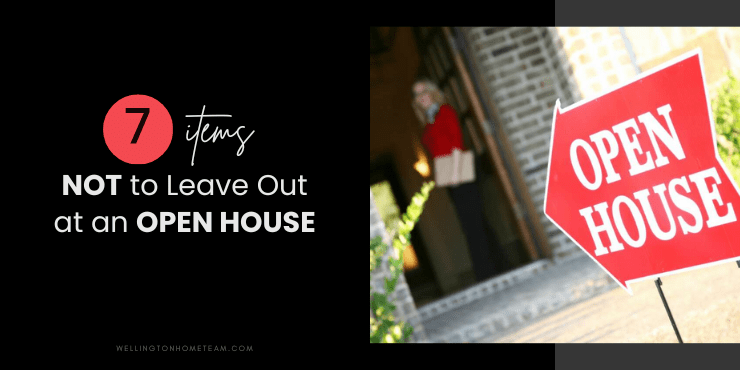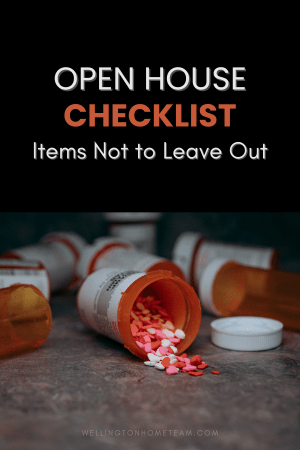7 Items Not to Leave Out at an Open House
There are a lot of moving parts when it comes to selling a home and one of those parts in many parts of the country is having an open house. Open houses offer potential buyers the opportunity to tour a property, envision their future in it, and evaluate its suitability.

While showcasing your home is essential, it’s equally important to be mindful of what you leave out during an open house. Let’s take a closer look at open houses, and discuss their pros and cons in addition to what not to leave out at an open house.
What is an Open House?
An open house is a real estate marketing strategy where a home that is currently listed for sale is made open to the public for viewing, typically without the need for an appointment. It’s an opportunity for potential buyers, real estate agents, and the curious public to visit the property, walk through it, and get a firsthand look at its features and condition. Key aspects of an open house include:
No Appointment Required
Unlike a private showing, where potential buyers schedule a specific time to view the property with their real estate agent, an open house doesn’t require an appointment. The property is open to the general public for a set period, typically a few hours on a specific day.
Accessibility
Open houses are typically held on weekends or during times when many people are available to attend. This accessibility makes it easier for a broader range of potential buyers to visit.
Hosting Agent
A real estate agent, often the listing agent, is usually present during the open house to answer any questions, provide information about the property, and provide property tours.
Marketing
Open houses are widely advertised through various channels, including online listings, real estate websites, social media, and traditional signage outside the property. This marketing aims to attract as many visitors as possible.
Promotion
The primary goal of an open house is to generate interest, attract potential buyers, and possibly lead to an offer or sale of the property.
Impersonal Viewing
Open houses tend to be casual and allow buyers to explore the property at their own pace. It’s an opportunity for them to get a feel for the layout, size, condition, and overall appeal without feeling rushed.
Open houses can be a great tool for both sellers and real estate agents to showcase a property to a broader audience. However, they may not always lead to a sale, as many visitors might be “window shopping” or not genuinely interested in buying. Nevertheless, open houses remain a popular method for marketing homes for sale and can be an effective way to create a buzz and generate potential leads.
If you're having an open house there are precautions that need to be taken. Here's a helpful checklist of 7 items not to leave out at an open house. #homeselling #openhousePros and Cons of Open Houses
Open houses can be a valuable tool when it comes to selling a home, but they also have their pros and cons. Here’s a breakdown of the advantages and disadvantages of hosting open houses for both sellers and real estate agents:
Pros of Open Houses:
- Increased Exposure: Open houses can attract a large number of potential buyers and curious neighbors, which can lead to increased visibility for the property.
 Convenience: Potential buyers can drop in without scheduling an appointment, making it more convenient for them to view the property.
Convenience: Potential buyers can drop in without scheduling an appointment, making it more convenient for them to view the property.- Face-to-Face Interaction: Open houses provide an opportunity for real estate agents to engage with potential buyers directly, answer their questions, and address concerns.
- Competition: The presence of multiple visitors at an open house may create a sense of competition, potentially leading to multiple offers, which could benefit the seller.
- Market Research: Feedback from open house visitors can provide valuable insights for both sellers and agents, helping them understand how the property is perceived and what improvements might need to be made.
- Potential Leads: Even if some visitors aren’t interested in the property, they may be looking to buy or sell another property in the future, turning them into potential leads for the agent hosting the open house.
Cons of Open Houses:
- Unqualified Visitors: Many open house attendees are “looky-loos” who may not be serious buyers. They may be curious neighbors or people just exploring the market without the intent to purchase.
- Security Concerns: An open house exposes the property to a large number of people, which can pose security risks, especially if personal belongings are not properly secured.
- Inconvenience for Sellers: Hosting open houses can be disruptive to sellers’ daily routines and privacy. It may require them to vacate the property for several hours.
- Costs: Hosting an open house incurs costs, such as advertising, refreshments, and possibly home staging, which may not always result in a sale.
- Limited Results: Open houses do not guarantee a sale. In fact, they often don’t lead to an immediate offer. They are just one of many marketing tools in the real estate agent’s arsenal.
While open houses can be beneficial in terms of exposure and potential leads, they come with the drawbacks of attracting unqualified visitors and security concerns. Whether to host an open house depends on the specific property and the preferences of the seller and the real estate agent. Some real estate professionals find open houses to be a valuable part of their marketing strategy, while others may opt for alternative approaches to sell properties.
If you're having an open house there are precautions that need to be taken. Here's a helpful checklist of 7 items not to leave out at an open house. #homeselling #openhouse7 Items Not to Leave Out at an Open House
Unlike a private showing, where a qualified buyer tours a property with their agent, an open house is open to the general public. This means anyone can walk through the home, often unaccompanied, and unfortunately, some of these people may have bad intentions. So if you decide to have an open house it’s important to prepare your home to be open to the general public. Below is a comprehensive list of items home sellers should not leave out at an open house.
1. Personal & Valuable Items
The open house is a time when your home is on display, and you have many visitors, including strangers and criminals. It’s crucial to safeguard personal and valuable items to prevent loss or theft. Items to consider securing include:
- Jewelry: Valuable jewelry, including family heirlooms and expensive pieces, should be kept safe, ideally in a safety deposit box.
- Money: Cash, checks, and credit cards should be kept in a secure location, preferably a locked safe.
- Prescription Medications: It’s advisable to store prescription medications in a secure, locked location.
2. Personal Documents & Identity
Your home may contain personal documents and identification that you don’t want accessible to visitors. Protect your identity and privacy by storing or locking away these items:
- Passports: Passports contain personal information and are crucial identification documents.
- Social Security Cards: These contain sensitive information and should not be accessible.
- Bank Statements and Tax Returns: Protect your financial data by storing these in a safe or locking them in a secure file cabinet.
 3. Electronics & Gadgets
3. Electronics & Gadgets
Electronics can be tempting for visitors to steal or accidentally damage during an open house. To avoid potential mishaps, consider the following:
- Laptops and Computers: Secure laptops and computers and make sure all devices are password-protected.
- Tablets and Smartphones: Lock these devices and keep them out of sight during an open house.
- Gaming Consoles and High-Value Electronics: These should be disconnected and stored safely.
4. Personal Photographs & Memorabilia
While personal photographs and memorabilia add character and warmth to your home, they can also distract potential buyers from envisioning the space as their own. Consider the following:
- Family Photos: Remove personal family photos to depersonalize the space.
- Valuable Artwork: High-value art pieces should be protected, even stored away.
- Personal Collections: Collectibles and personal memorabilia can be distracting.
5. Sensitive or Private Items
Certain items should remain confidential and private, so they should be kept out of sight and stored away:
- Personal Letters and Correspondence: Ensure that personal letters, diaries, or any written correspondence are stored away.
- Sensitive Personal Information: Any documents or items that contain sensitive personal information should be stored securely.
6. Weapons & Firearms
Safety is paramount during an open house. Keep firearms and weapons safely secured and out of reach:
- Guns and Firearms: Guns should be stored securely in accordance with local laws and regulations.
- Knives and Other Weapons: Any potentially dangerous items should be safely stored.
7. Personal Toiletries & Hygiene Products
While these items might seem harmless, personal toiletries and hygiene products can leave a messy and unfavorable impression. Make sure to remove items like:
- Toothbrushes and Toiletries: Store personal hygiene items in a bathroom drawer or cabinet.
- Prescription Glasses: Keep these in a safe place to avoid misplacement.
Final Thoughts
Having an open house when selling a home can be very tempting but it’s important to consider all of the pros and cons of doing so. If you decide to move forward with having an open house it’s imperative to remove items listed in our comprehensive list.
While the majority of visitors at your open house are likely genuine buyers or mean no harm, it’s always better to err on the side of caution. There are plenty of criminals that are casing homes and will steal items during the open house or at a later date. By taking proactive steps to secure and safeguard personal, valuable, and sensitive items, you will have less to worry about.
Please consider spreading the word and sharing; 7 Items Not to Leave Out at an Open House | A Comprehensive Guide
If you're having an open house there are precautions that need to be taken. Here's a helpful checklist of 7 items not to leave out at an open house. #homeselling #openhouseAbout the Author
Top Wellington Realtor, Michelle Gibson, wrote: “7 Items Not to Leave Out at an Open House | A Comprehensive Guide”
Michelle has been specializing in residential real estate since 2001 throughout Wellington Florida and the surrounding area. Whether you’re looking to buy, sell, or rent she will guide you through the entire real estate transaction. If you’re ready to put Michelle’s knowledge and expertise to work for you call or e-mail her today.
Areas of service include Wellington, Lake Worth, Royal Palm Beach, Boynton Beach, West Palm Beach, Loxahatchee, Greenacres, and more.
7 Items Not to Leave Out at an Open House | A Comprehensive Guide

 Convenience: Potential buyers can drop in without scheduling an appointment, making it more convenient for them to view the property.
Convenience: Potential buyers can drop in without scheduling an appointment, making it more convenient for them to view the property. Michelle Gibson of the Hansen Real Estate Group Inc is a full-time REALTOR who has been specializing in Wellington Florida real estate since 2001. This veteran of the real estate industry has expertise in technology, marketing, and social media.
Michelle Gibson of the Hansen Real Estate Group Inc is a full-time REALTOR who has been specializing in Wellington Florida real estate since 2001. This veteran of the real estate industry has expertise in technology, marketing, and social media.